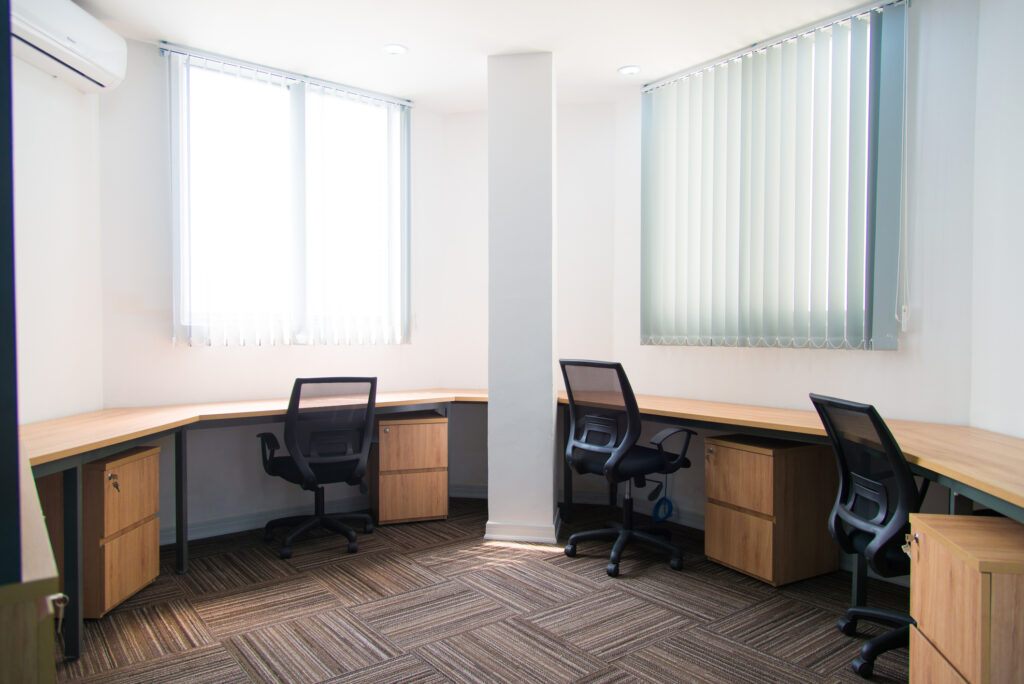
Cost-Effective Solutions: Renting Private Offices vs. Traditional Leasing
In today’s fast-paced business world, flexibility and cost-efficiency influence a company’s growth and success.
This is particularly evident in office space decisions. Traditional long-term leasing has long been the standard, but renting private offices is becoming a popular alternative.
This shift stems from private offices’ tangible benefits: cost savings, flexibility, and reduced overhead.
Let’s dive into the details.

Flexibility and Adaptability
In the dynamic and competitive business world, renting private offices offers flexibility and adaptability that traditional leasing arrangements need to match.
This flexibility is not merely an added perk; it’s fast becoming a business necessity in the face of a volatile and constantly evolving corporate landscape.
Pivoting with Business Needs
At the heart of this advantage lies the flexibility to pivot with the rhythm of your business needs. As your company grows, shrinks, or changes direction, so can your office space.
Whether you’re launching a new project, experiencing a surge in demand, or weathering a downturn, your office space can reflect your current needs without the burden of long-term commitments.
Renting private office spaces allows you to adjust your office space commitments based on your requirements at any given moment. This adaptability eliminates the financial pressure and commitment of long-term leasing, allowing businesses to remain agile and responsive.
The Freedom to Expand
The journey of a tech startup serves as a perfect illustration of this benefit. Many tech startups begin small but have the potential for rapid and significant growth.
This unpredictability can make traditional leasing an unsuitable and risky choice.
Let’s consider a hypothetical tech startup. They initially rented small private office space but experienced a swift upturn in growth and quickly outgrew their office.
With traditional leasing, they could have been trapped in a restrictive, insufficient lease, stifling their expansion. But by opting for a private office rental, they enjoyed the freedom to seamlessly transition into a larger space within the same building as their needs change.
Meeting Project-Specific Needs
Another added benefit is the ability to cater to project-specific needs. For businesses managing multiple projects, the ability to scale office space up or down as per each project’s life cycle is crucial.
For example, a company might need additional office space for a three-month project. Rather than committing to a long-term lease for this temporary need, a private office can be rented specifically for this short-term period and vacated once the project concludes.
This advantage of private office rentals extends to companies with remote employees who occasionally need an office. Rather than leasing extra space that mostly sits idle, businesses can rent private office spaces only when necessary, providing a more cost-effective and flexible solution.

Cost Savings
Traditional office leasing often entails a hefty upfront cost and a long-term financial commitment.
On the other hand, private offices are usually rented month-to-month, eliminating the burden of significant initial investment. This offers businesses a budget-friendly solution, freeing up capital for other investments.

Reduced Overhead: Maximizing Financial Efficiency with Private Office Rentals
Overhead costs can significantly burden a company’s budget, particularly for startups and small businesses.
Traditionally, these costs can balloon due to various factors, from furnishing an office to maintaining its functionality.
One of the notable advantages of private office rentals is the opportunity to substantially decrease these overhead costs, contributing to increased financial efficiency and business sustainability.
Furnished and Ready-to-Use Spaces
Contrary to traditional leases, private offices often come fully furnished. This means businesses can forego the significant costs associated with procuring office furniture and setting up the workspace, not to mention the time and resources dedicated to the procurement and installation process.
Desks, chairs, filing cabinets, lounge areas – all these elements are ready and waiting in a private office space. This advantage is not just about cost; it’s also about convenience and speed, allowing businesses to get up and running in their new space without delay.
Inclusive Utilities and Services
In addition to the cost savings from furnished spaces, private offices typically include essential utilities and services in the rental cost.
This arrangement covers electricity, water, heating and cooling, internet, and even telephone services, which can be substantial additional expenses in a traditional lease.
Furthermore, the office provider typically handles maintenance issues, from a leaky faucet to HVAC malfunctions, eliminating the need for companies to spend time and money on these often unexpected and unpredictable costs.
Cleaning, Security, and Reception Services
Moreover, most private office providers offer cleaning and security services as part of their package.
This alleviates businesses from the responsibility and cost of hiring separate service providers for these tasks. A clean, secure environment offers peace of mind and contributes to the productivity and well-being of the workforce.
Additionally, some private offices offer reception services, providing a professional front for your business without the need for additional staff hires.
Shared Amenities
Private offices often feature shared amenities like meeting rooms, break rooms, kitchens, and sometimes gyms or rooftop terraces.
These shared resources provide an enhanced work environment without the extra square footage cost. Businesses benefit from using these amenities when needed, fostering a conducive and pleasant working atmosphere that can help attract and retain talent.

Embracing the Future: The Sustainability of Private Office Rentals
Adaptability and foresight are critical for success in a rapidly evolving corporate landscape.
With the shifting work patterns and the push towards more agile business operations, private office rentals present a sustainable solution, answering the needs of the modern workforce.
Future-Proofing Your Business
Choosing to rent a private office is a way to future-proof your business.
With technological advancements and shifts in the corporate culture, the way we work is continuously evolving.
Businesses increasingly opt for remote work, project-based contracts, and flexible work hours.
In this scenario, the traditional leasing model seems outdated with its rigid contracts and space limitations.
Eco-Friendly Office Spaces
Moreover, private office rentals contribute to a more sustainable business model financially and environmentally.
Shared amenities and utilities mean less wastage.
This aligns your company with the global movement towards more sustainable business practices, which is increasingly appealing to customers, employees, and stakeholders.
Building a Community
Finally, private office spaces often foster community, which can be an invaluable asset in the business world.
Shared workspaces offer networking opportunities, foster collaboration, and can lead to partnerships and innovation.
This creates an environment that encourages growth and allows businesses to learn from each other, another benefit traditional leases typically don’t provide.
Conclusion
The shift towards renting private offices indicates its financial benefits over traditional leasing.
With significant cost savings, flexibility, and reduced overhead, businesses can optimize operations, redirect funds toward growth initiatives, and adapt swiftly to market changes.
This model offers a cost-effective solution that caters to the dynamic needs of modern businesses, setting them up for success in a competitive market.
If you are considering making a move, consider these advantages. Make a choice that positions your business for financial efficiency and future growth.